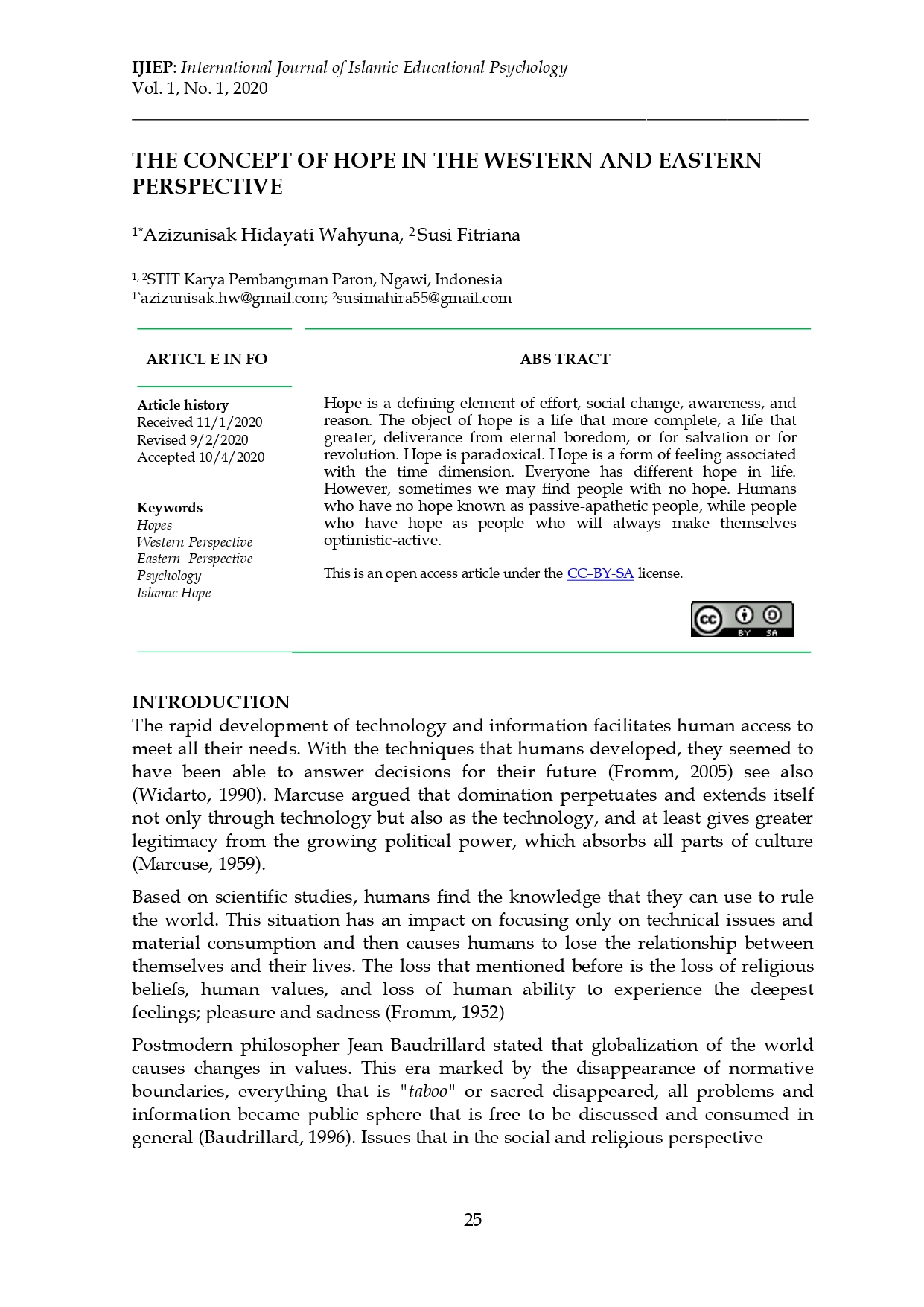The Concept of Hope in The Western and Eastern Perspective
DOI:
https://doi.org/10.18196/ijiep.1103Keywords:
Hopes, Westrn Perspective, Estrn Perspective, Islamic Hope.Abstract
Hope is a defining element of effort, social change, awareness, and reason. The object of hope is a life that more complete, a life that more great, deliverance from eternal boredom, or for salvation or for revolution. Hope is paradoxical. Hope is a form of feeling associated with the time dimension. Everyone has different hope in life. However, sometimes we may find people with no hope. Humans who have no hope known as passive-apathetic people, while people who have hope as people who will always make themselves optimistic-active.
References
Al-Jauzi. (1975). Arruh fi Kalam ala Arwahil Amwat wal Ahya’ bidalail minal Kitab was Sunnah.
Bailey, T., Eng, W., Frisch, M., & Snyder†, C. (2007). Hope and optimism as related to life satisfaction. The Journal of Positive Psychology, 2, 168–175. https://doi.org/10.1080/17439760701409546
Baudrillard, J. (1996). The system of objects. Verso.
Chaer, M. T. (2016). Agama dan Psikologi; Antara Superioritas dan Inferioritas. Al-Mabsut: Jurnal Studi Islam dan Sosial, 10(1), 14.
Chaer, M. T., & Febrianingsih, D. (2018). Positive Psychology: Personalities, Major Issues, Advantages and Disadvantages. MUADDIB : Studi Kependidikan Dan Keislaman, 8(1), 20.
Dalai Lama. (2013). His Holiness the 14th Dalai Lama. Tulane University. https://www2.tulane.edu/grads/speaker/dalai-lama.cfm
Fromm, E. (1941). Escape from Freedom. Science and Society, 6(2), 187–190.
Fromm, E. (1952). Psychoanalysis and Religion. Philosophy, 27(103), 373–374.
Fromm, E. (1962). Beyond the Chains of Illusion: My Encounter with Marx and Freud. Continuum.
Fromm, E. (1968). The Revolution of Hope. Harper & Row.
Fromm, E. (2005). To have or to be? (Rev. ed.). Continuum.
Ibnu Al-Wazir. (1990). Zadul Ma‟ad Bekal Perjalanan ke Akhirat terjemahan dari Kitab Mukhtasar Zadul Ma‟ad. Pustaka Azzam.
Lewis Mumford. (1967). The Myth of the Machine (Vol. I): Technics and Human Development: Vol. I. Harcourt, Brace Jovanovich.
M. Suud, F. (2018). Pendidikan Kedamaian di Era Digital (Telaah Model Forgiveness dalam Psikologi Islam). FIKROTUNA, 7(1), 694–716. https://doi.org/10.32806/jf.v7i1.3170
Marcuse, H. (1959). One-Dimensional Man. 324.
Marx, K. (1844). Economic & Philosophic Manuscripts of 1844. 81.
Setiawan, W., Suud, F. M., Chaer, M. T., & Rahmatullah, A. S. (2018). Pendidikan Kebahagiaan dalam Revolusi Industri 4. AL-MURABBI: Jurnal Kependidikan dan Keislaman, 5(1). http://ejournal.kopertais4.or.id/mataraman/index.php/murabbi/article/view/3403/2530
Snyder, C. R., & Lopez, S. J. (2007). Positive psychology: The scientific and practical explorations of human strengths. SAGE Publications.
Snyder, Lopez, & Pedroti. (2001). Positive Psychology; The Scientific and Practical Explorations of Human Strengths. Sage Publications Inc.
Widarto. (1990). Teknologi Harapan: Antara Harapan dan Kenyataan. Cakrawala Pendidikan.
Yusuf, M., Kahfi, D., Ibala, M., & Chaer, M. T. (2018). Sabar dalam Perspektif Islam dan Barat. AL-MURABBI: Jurnal Kependidikan dan Keislaman, 4(2), 14.

Downloads
Published
How to Cite
Issue
Section
License

- Share — copy and redistribute the material in any medium or format
- Adapt—remix, transform, and build upon the material for any purpose, even commercially.
The licensor cannot revoke these freedoms as long as you follow the license terms. Under the following terms:
- Attribution: You must give appropriate credit, provide a link to the license, and indicate if changes were made. You may do so in any reasonable manner, but not in any way that suggests the licensor endorses you or your use.
- ShareAlike: If you remix, transform, or build upon the material, you must distribute your contributions under the same license as the original.
- No additional restrictions — You may not apply legal terms or technological measures that legally restrict others from doing anything the license permits.






